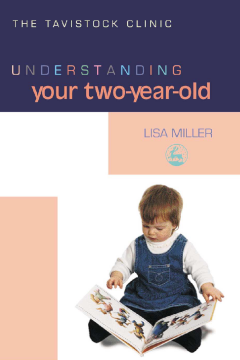
Additional Information
Book Details
Abstract
What makes children in their 'terrible twos' behave as they do? How can parents decide when their child is ready for day care, and manage their child's transition to a trusted child minder? Lisa Miller guides parents through their two-year-old's development, from how to deal with a 'bossy boots' to understanding the central importance of toys, and the development of language and nonverbal communicative skills. She describes ways in which parents can help a young child express or resolve difficult feelings or jealousy, come to accept and welcome a new-born sibling, and negotiate friendships.
They are a rich resource of balanced, sensitive and non-judgemental advice to help parents and professionals looking after children... The central subject is the mental and emotional development of children and their parents. And the style is intelligent and friendly. Each book is divided into very easily digestible sections, with excellent (and often very funny) case studies scattered liberally throughout and a really detailed contents page for those "where did I see that bit about" moments... The books form a cohesive and continuous guide to almost everything I have ever wondered about bringing up my children. I learnt a lot. And a friend, mother of her first two-year-old, could not wait to get her hands on these when I described them. They are now going into our bathroom "reference library" for family and visitors to peruse and digest.
0-19 Magazine
This book is a gently reassuring and readable publication in which the author, a consultant child and adolescent psychotherapists, describes the complexities involved in the physical and emotional development of the two-year-old child, and sensitively explores the frustrations and challenges these experiences bring to parents and their offspring. The author also infuses the reader with a feeling of acceptance and wonder at the attributes that this `very small person' is attaining during this stage of early years development... Managing difficult behaviour, including impulsiveness and inquisitiveness, is explained and an understanding of the childs perspective is expressed. Family stability and change, and the effects this may have on the child, are discussed with sincerity with a relaxed and knowledgeable writing style. I would recommend this book to anyone who has a child of this age or who has contact with young children at work or within the family. It offers interesting insight and understanding and is written in a positive respect for the individuals of the future.
Community Practitioner
Lisa Miller is consultant child and adolescent psychotherapist and, until recently, Chair of the Child and Family Department at The Tavistock Clinic. She is Editor of the International Journal of Infant Observation.
Table of Contents
| Section Title | Page | Action | Price |
|---|---|---|---|
| About the authors | |||
| Acknowledgments | |||
| Abbreviations and acronyms | |||
| Stepping Stones with Children Book 1 | |||
| Introduction | |||
| Session 1: Getting started | |||
| Session 2: Using our brains | |||
| Session 3: Gender and sex | |||
| Session 4: Child rights and sexual and reproductive rights | |||
| Session 5: The tree of life | |||
| Session 6: How to be assertive | |||
| Session 7: All about virtues | |||
| Session 8: The power of love | |||
| Session 9: Bringing out the best in each other | |||
| Session 10: Coping with loss and the tree of love | |||
| Session 11: Understanding death and coping with our feelings | |||
| Session 12: All about HIV | |||
| Session 13: Testing for HIV and talking about it | |||
| Session 14: Living well with HIV | |||
| Session 15: Partners in health care | |||
| Stepping Stones with Children Book 2 | |||
| Session 16: Friendship | |||
| Session 17: Going to school | |||
| Session 18: Managing alcohol and other drugs | |||
| Session 19: When we are growing up | |||
| Session 20: Relationships, love and sex | |||
| Session 21: Our sexual feelings and sexual safety | |||
| Session 22: Pornography | |||
| Session 23: Delaying, starting, and stopping having sex | |||
| Session 24: All about condoms | |||
| Session 25: Children by choice not chance | |||
| Session 26: Protecting each other from sexual abuse | |||
| Session 27: Supporting survivors of sexual abuse | |||
| Session 28: Learning and contributing | |||
| Session 29: Livelihoods |
